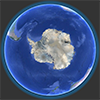

Name: Alison Massey
Job: Marine Biologist
Location: Rothera Research Station, Adelaide Island, Antarctic Peninsula
Rothera Research Station is the British Antarctic Survey’s (BAS) centre for marine science. Experienced divers explore the underwater realm all year round. In the winter months the sea freezes, so divers have to cut a hole in the ice before they can dive down below the frozen surface.
1/5
Each morning a dive meeting is held to check the weather forecast and see if water conditions are favourable. If all is well, the Dive Master gives the all clear and the divers can start to get ready - it is vital to carefully check all your equipment each time you dive.
Marine biologists get ready in the Dive Store before loading their tanks and equipment onto the boat, which is then driven down to the wharf and lowered into the Antarctic waters. The Dive Master, Boatman and dive team climb down a ladder to get on board.
2/5
You get to the dive site in a British Antarctic Survey RIB - a Rigid Inflatable Boat. BAS has two of these craft at Rothera Research Station. They are fast and manoeuverable, ideal for travelling around the waters of the Antarctic Peninsula, which are generally full of icebergs and other "bergy bits".
Every diver always has a dive partner, or buddy, and strict rules are followed to keep everyone safe. The Dive Master keeps a careful eye on the sea conditions and local wildlife and decides whether the dive can begin.
3/5
It's time for the dive. After final checks from the Dive Master and a last thumbs up, it is time to go. Divers enter the water backwards due to the heavy weight of the breathing equipment on their backs. Once you are in the freezing sea, it is time to swim downwards and start gathering that data...
4/5
Antarctic marine data is vitally important to help us try and understand the impact that changes in the global environment are having on the Antarctic and its abundance of undersea life.
Download and use your data to plot graphs or charts and see if you can identify trends or changes that are occurring as you get deeper into the polar ocean. Compare your data to see if anything appears to be linked, or perhaps reflects the opposite trend.
5/5